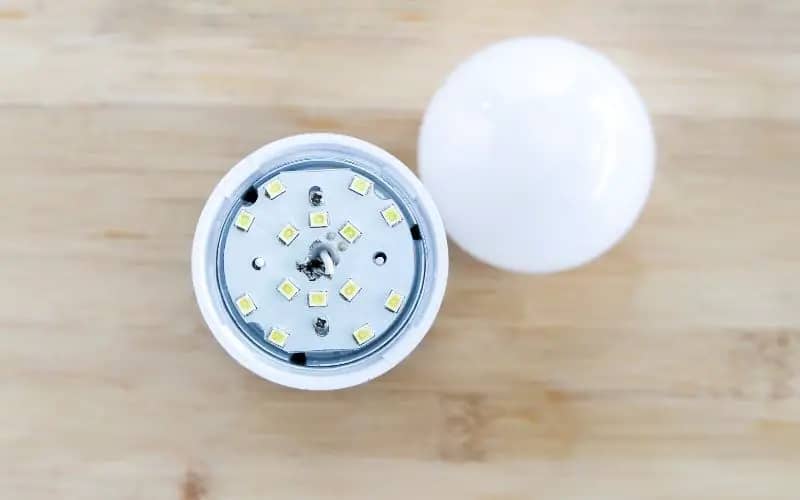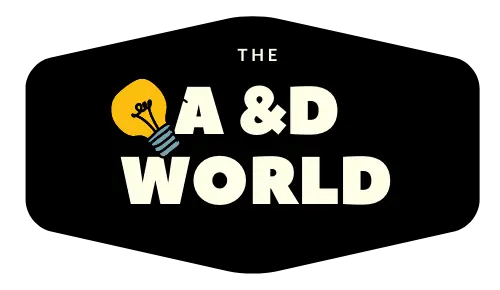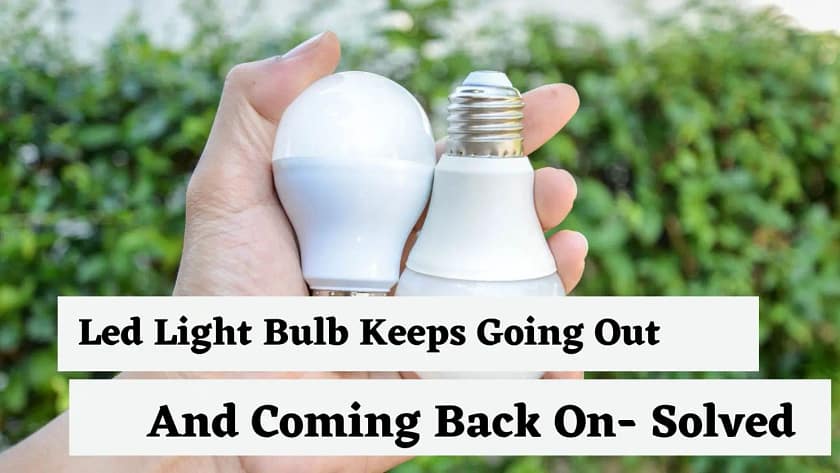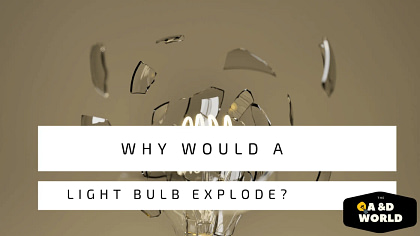LED light is a powerful way to light your home and could take longer than a decade to replace it. Technology has advanced to make light bulbs smart and easy to control with your smartphone. But LEDs operate differently than old light bulbs, which may cause a certain amount of complications as they fit into old circuits.
LED bulbs are safe and energy-efficient, and you can install them both indoor and outdoor. They are perfect for recessed and ambient lighting and like many bulbs, some problems can cause them to malfunction.
In this post, I’ll examine some more frequent problems causing your Led Light Bulb to Keep Going Out And Coming Back On. These include dimmers, overload circuits, dusty sockets, inrush current, loose wiring, and LED malfunctions.
Before we dive into the problems below, if you recently switch to LEDs from traditional light bulbs and still using your old dimmers, then that’s the reason your lights are flickering. Dimmer compatibility is a common problem associated with light flickering, but the good news is there is an easy fix.
Because old dimmers work with high watt loads when controlling incandescent bulbs, they work by changing the amount of current that flows into the bulb.
However, LEDs do not function that way. If you cut the current from the bulbs, it comes off completely causing your bulbs to come on and off.
An easy fix is to purchase LED dimmer compatible switches these include brands like Philips Hue or Lutron Caseta. It is an additional cost, but it saves you all the trouble of flickering lights and ensures the longevity of your LEDs.
Other Common Problems With LEDs Include:
Inrush Current
Whenever you turn on high voltage/wattage devices, do your LED bulbs come on and off? This involves appliances like a washing machine or water heater.
When this happens, you are experiencing an inrush current. Let’s explore this further: according to visualcapitalist.com, your water heater uses 14% energy consumption each year with other appliances using even more.
If your LEDs are connected to the same circuit as your equipment, their low-energy features cause these appliances to suck up most of the energy, leaving fewer resources for your bulb. Therefore, triggering a voltage reduction leaving your bulb to flicker.
Loose wiring Or Bulb
Another factor that causes LED bulbs to flicker is loose connections or circuits. If this is the case, simply tighten the LED bulb and see if it stops turning off and on. Inspect the fixture and if there are lots of dust in the attachment point, quickly blow them off and screw the bulb back in.
Is your bulb screwed in too tight? If your LED isn’t too loose then your bulb is tight. This can ruin the connection to your fixture causing it to flicker.
At the fixture attachment point, there might even be loose cables. An electrician can fix this by re-tightening the wire. However, if this does not work, he will check the panel box to see if he can find the culprit.
LED Malfunction

There are a few reasons your LEDs are malfunctioning, like poor materials and exposure to heat.
Hot Places–LEDs that are placed in an environment that is too hot produce less light than planned and degrade faster than expected. In extreme conditions, your LEDs can stop working. Minor overheating in LEDs can lead to the bulb turning on and off, and color reduction. However, significant overheating will lead to noticeable decoloration and physical damage to the LED.
Use of poor-quality materials-If your LEDs contain poor-quality materials, then they will malfunction. Take the LED drivers, for instance, the driver converts AC power into DC power so your LEDs can work.
If low-grade materials are used to construct the driver, then your LEDs may fail. You will notice if your LEDs contain low-quality materials when it flashes; these are early signs of driver failure. To combat this, look for bulbs that offer a warranty.
Why Do Bulbs Burn Out?
The position of your bulbs can affect their functionality. For instance, recessed or can light resides in your ceiling while newer models are IC-rated older cans sometimes overheat. To prevent overheating your bulbs shut off or flicker. Your best solution is to replace any old cans with IC-rated bulbs.
High voltage is a problem and will destroy your LED bulbs and cause them to burn out faster than they should. LEDs have a lifespan of 4-5 years, however, if your fixture is burning multiple bulbs in months then the current in your home is too high. If you think this is the cause, call your electrician to test the voltage in your home and call your electricity provider to rectify the problem.
In rare cases, your LEDs may go bad because of DAB radio interference. The Which Conversation did a few testing with cheap LEDs and digital radio. During testing, they notice the signal went fuzzy within a few centimeters of each other. If this happens, the best way to solve this problem is to contact your electrician so they can identify the precise cause.
There are many reasons your bulbs are turning off and on. Just yesterday, one of my LED bulbs was experiencing the same issue. But after eliminating all the problems above, I realize the bulb was malfunctioning so; I replace it with a new bulb and it solved the problem.
However, after changing your bulbs and you are still experiencing LEDs flicking or burning out then you’ll need to call a trained electrician so they can source the problem and answer all your concerns. LEDs are energy efficient and last longer than conventional bulbs.





